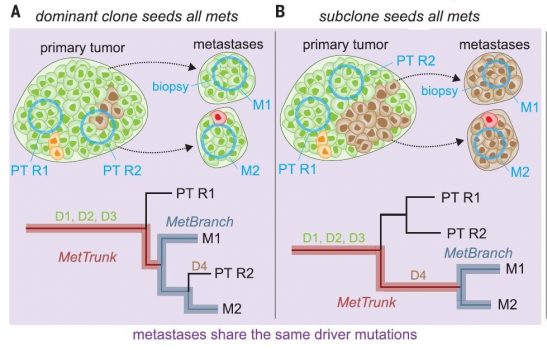Identical driver gene mutations found in metastatic cancers

Driver genes in different metastases from the same patient are remarkably similar, providing optimism for the success of future targeted therapies, according to a published study by Science.
The report, “Minimal Functional Driver Gene Heterogeneity Among Untreated Metastases,” looked at data from samples that have spread from the site of origin to another part of the body in 20 patients with breast, colorectal, endometrial, gastric, lung melanoma, pancreatic or prostate cancers. The researchers found within individual patients, driver gene mutations were common to all metastatic deposits.
Bert Vogelstein, M.D., and Kenneth Kinzler, Ph.D., co-directors of the Ludwig Center at the Johns Hopkins Kimmel Cancer Center, and Rachel Karchin, Ph.D., from the Johns Hopkins Institute for Computational Medicine, were involved in this study.Vogelstein noted that though there are thousands of mutations in every tumor, the only ones that matter are driver genes.
“If the driver gene mutations in different metastatic lesions from the same patient were heterogeneous, there would be little hope for new targeted therapies to induce clinically important remissions or cures,” Vogelstein said.
“Such therapies would shrink only a subset of the metastatic lesions, and the rest would continue to grow unabated. Fortunately, this does not appear to be the case, providing optimism for the success of future targeted therapies, particularly when combinations of such therapies can be used.”
Driver gene mutations can be captured in single biopsies, providing essential information for therapeutic decision making.
“If numerous biopsies from different parts of the tumor were always required to capture this information, the task for the clinician and the discomfort to the patient would be much more challenging,” Vogelstein said.
The authors noted that it will be critical to extend this analysis to larger groups of patients and more cancer types to investigate whether minimal driver gene mutation heterogeneity is a general phenomenon of advanced disease.
Researchers from the Stanford University School of Medicine, Harvard University, and the Memorial Sloan Kettering Cancer Center were involved in the study and included Johannes Reiter, Alvin Makohon-Moore. Jeffrey Gerold, Alexander Heyde, Marc Attiyeh, Zachary Kohutek, Collin Tokheim, Alexia Brown, Rayne DeBlasio, Juliana Niyazov, Amanda Zucker, Christine Iacobuzio-Donahue and Martin Nowak.
